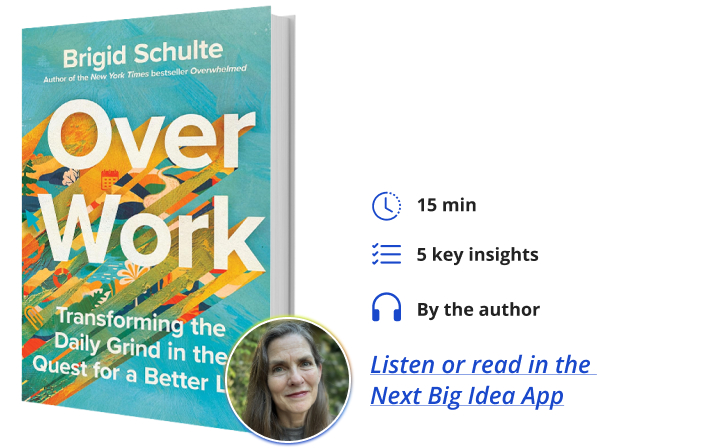Brigid Schulte is a journalist, New York Times bestselling author of Overwhelmed, and the director of the Better Life Lab at New America. She is also a mother, a wife, a daughter, a sister, an aunt, a friend, and a neighbor. During her time reporting for The Washington Post, she was part of a team that won a Pulitzer Prize.
Below, Brigid shares five key insights from her new book, Over Work: Transforming the Daily Grind in the Quest for a Better Life. Listen to the audio version—read by Brigid herself—in the Next Big Idea App.

1. Work isn’t working. It may even be killing us.
We work to earn a living, support our families, buy our daily bread, and survive. We also find meaning and a sense of fulfillment in work. Our identities can be wrapped up in our jobs. The first question we often ask after an introduction is, “What do you do?” A majority of people say they would want to keep working even if they won the lottery.
But work has become more of a grind. Gallup surveys show that workers are disengaged and unhappy. They feel they’re working all the time, and when they’re not, they’re consumed by thinking about work or feeling guilty that they’re not working. Many people feel like they’re working harder and falling further behind.
From the end of World War II through the 1970s, as productivity rose in the United States, so did wages. But ever since then, wages have barely budged because of tax policy, decisions in Washington, and corporations deciding that their purpose is to make lots of money for a small number of shareholders. A few decades ago, the average CEO earned about 30 times what an average worker did. Now, it’s 399 times or more.
The RAND Corporation estimates that between 1975 and 2018, five trillion dollars were transferred from the bottom 90 percent to the top one percent. The United States now has one of the highest rates of economic inequality of any advanced country. Workers are no longer enjoying the fruits of their labor. Forty-four percent of the U.S. workforce (the richest in the world) is low-wage. Two-thirds of those earning the lowest wages are women, often women of color. Congress hasn’t raised the federal minimum wage of $7.25 since 2009. It’s $2.19 for tipped workers and as low as 25 cents an hour for disabled workers. Meanwhile, the cost of housing, food, education, child care, and health care have continued to climb. The minimum wage would have been $23 an hour in 2021 if it kept up with inflation and productivity growth.
We have this idea that if people are struggling financially, they just need to work harder. But one study showed that nearly three-fourths of those who are poor enough to qualify for some public benefits in the U.S. already work full-time. People are not lazy; too many jobs don’t support human life. And work has become bad for our health. Work stress and burnout are so prevalent that in 2019, the World Health Organization declared them serious problems. One analysis found that, in the United States, the way we work is the fifth leading cause of death.
Take, for example, Cate Lindemann. She was a dedicated lawyer who worked long hours under demanding, stressful, and often toxic conditions. One day, she began having unbearable chest pains and wound up in the ER. She was a young, healthy woman in her mid-thirties. Yet she was also having a heart attack, brought on by acute work stress. “Wow,” her doctor told her, “Your job really made you sick.”
2. Working hard doesn’t mean working long hours.
Economists say work has become greedy. In many workplaces, the person working the longest hours is seen as the best worker and is rewarded with higher pay and promotions. Someone else is expected to take care of any family or outside duties. Americans now work among the longest hours of any advanced economy.
Professional workers are driven to overwork in one job, striving to be seen as ideal workers. I found hourly workers overworking in precarious part-time jobs, gigs, and side hustles to survive. Many of them are expected to be on call at all hours, ready to drop everything to go to work at a moment’s notice.
“The longer a country’s work hours, the lower its productivity.”
We all value hard work, but working hard doesn’t mean working long hours. Research shows that longer work hours are counterproductive to producing quality work. Instead, they can lead to higher rates of burnout, exhaustion, unnecessary mistakes, and fuzzy thinking. International comparisons show how celebrating long work hours is disconnected from reality: the longer a country’s work hours, the lower its productivity.
Rewarding long work hours is also a big reason why women earn less and are promoted less often than men. Women are still primarily responsible for taking care of their families at home. They’re simply unable to put in the same long hours at work. But it’s not just women anymore. One Harvard Business School survey found that nearly three-fourths of all workers have care responsibilities at home.
3. Focus on priorities, process, and performance.
I reported on work redesign efforts, following organizations that were forced to experiment and get creative during the pandemic. When they focused on priorities, streamlined processes, and measured performance, they created cultures of high trust, productivity, performance, and equity.
It’s easier for managers to measure the input of long work hours. Evaluating the output or impact of what workers produce is much harder. Yet, that’s what leads to better work. Managing by output and impact allows for flexibility in when, where, and how people do their work. Giving people autonomy and more control over their schedules fosters a more engaged workforce that does better work and gives people more time for their lives. It levels the playing field for workers with care duties. It also opens the door to shorter work hours.
In long work-hour cultures, there’s a lot of what researchers call “waste” and what I call “stupid work.” Things like bloated meetings, too much email, inefficient or overly complicated systems, and too much time on low-value tasks. I went to Iceland, where they’ve enforced shorter work hours at the same pay rate available to 85 percent of the workforce. To do that, every team in every organization had to rethink how they work. They had to start from scratch: identify the most valuable work and reorganize their days accordingly.
For example, Asberg Jónsson, CEO of a travel agency, began questioning his assumptions about the best way to work and his proclivity to work long hours after becoming a father. He and his team took a hard look at their daily operations. They automated some time-consuming processes, cut out dull, unimportant work, reduced work hours at the same pay, and made them flexible. That opened time for marketing and creative projects, which led to growth, which created more jobs, and gave Jonsson more time at home with his family.
4. When you put human wellbeing first, everybody wins.
People are often the biggest expense on a company’s balance sheet. So, when profits are down, or companies want their books to look good for quarterly earnings reports, the first thing they often do is cut labor costs by laying off or firing people. However, treating workers as widgets is not good for people or businesses. In the most basic sense, you’re only as good as your people, and treating them well pays dividends.
Cultures that value well-rested and healthy workers—taking breaks throughout the day, setting firm boundaries around work, and encouraging vacation—create the conditions for more innovation. Neuroscience shows that rest is the key to fresh thinking. Our brains are wired to have our best ideas when we’re relaxed, not powering through another long, stressful day.
“Neuroscience shows that rest is the key to fresh thinking.”
Making all jobs good jobs sets off a virtuous upward spiral. Washington state demonstrated this through an overhaul of the home care industry. As our society ages, home care workers are projected to be the largest occupation in the economy in the 2030s. This is important work. Yet the jobs are terrible. Most home care workers earn poverty wages. They work unpredictable schedules and have no benefits. So, there aren’t enough people willing to do the job to meet the demand.
The state of Washington worked with union and business leaders to make these jobs good jobs. Now, home care workers earn living wages. They have retirement savings, health care, paid sick days, free training, and other benefits. As a result, the home care workforce is more stable. That’s made the quality of care better for those who need it, and with more people able to stay out of expensive nursing homes, the state is saving money.
5. We need to think about work in a bigger way.
I love my work. But what I consider “work” isn’t only what I do for my paid job. It is also the unpaid work of caring for my family, making a home, and volunteering in my community. But paid work is what society values most highly. Paid work is what we count in Gross Domestic Product to measure a nation’s wealth. Since we don’t value unpaid work in the same way, it’s squeezed into the corners of our lives. Yet it’s enormously valuable work: Economists calculate that GDP would get a boost of between 25 and 40 percent if we included the unpaid work of care and home. Our unpaid work is also what makes life worth living. It’s time to think about work as both what we do for pay and our unpaid labor of care and home.
The Dutch historian Jan Lucassen says that throughout human history, good work has been defined by three principles: meaning, fairness, and cooperation. That means getting the basics right, ensuring paid work can support a decent life, being flexible, focused on output, and making room for our unpaid work. It means coming together as societies to weave stronger and fairer nets for when we’re out of paid work.
We are over work. Done. It’s time to transform the daily grind into something much better. The stories I tell in my book show the way. We are limited only by the horizon of our imaginations. It’s time for a new story of work that recognizes solving overwork as a collective responsibility. Corey Feist, one of the many people reimagining work, told me, “We don’t need more resilient canaries. We need a new coal mine.”
To listen to the audio version read by author Brigid Schulte, download the Next Big Idea App today:































